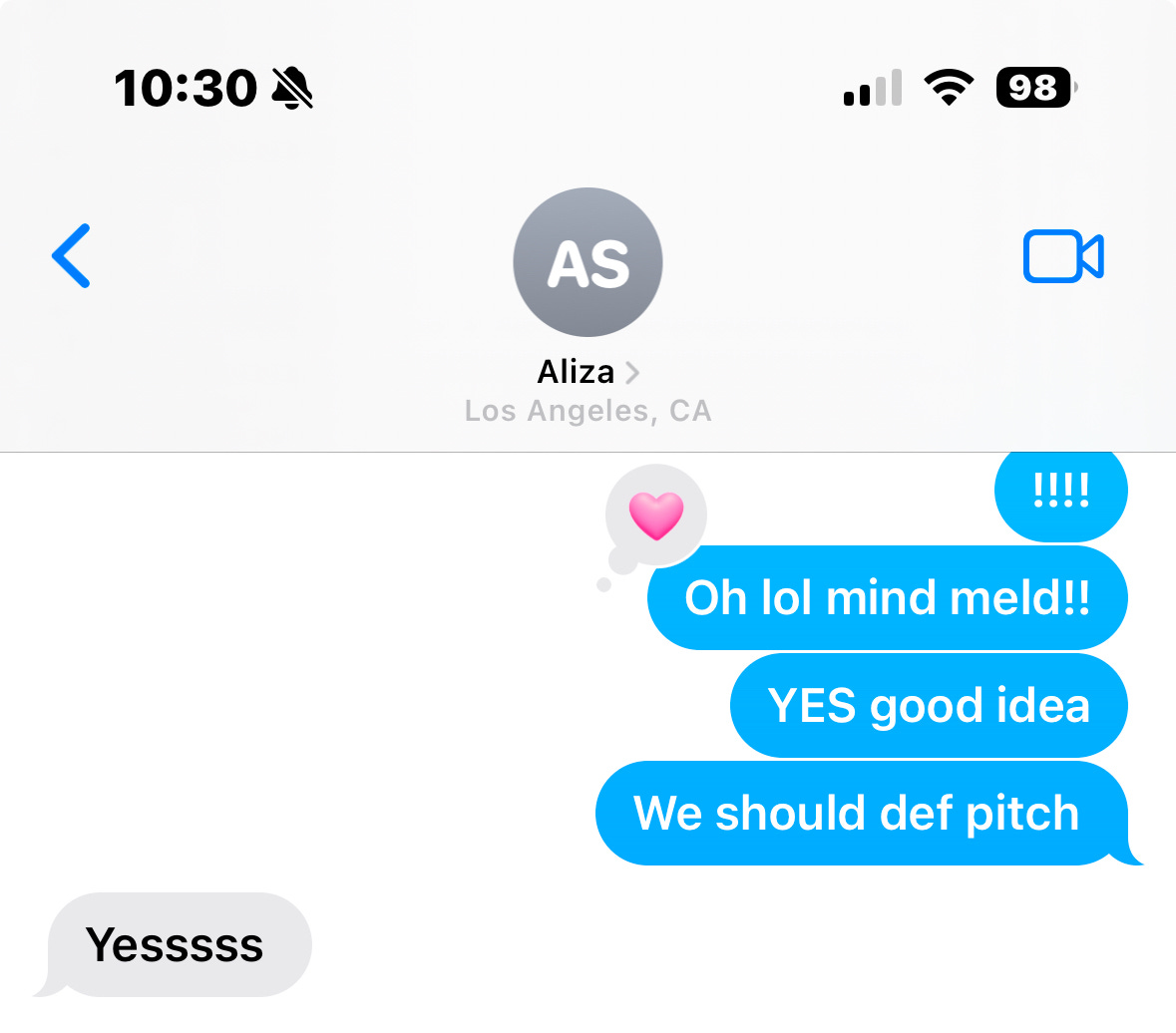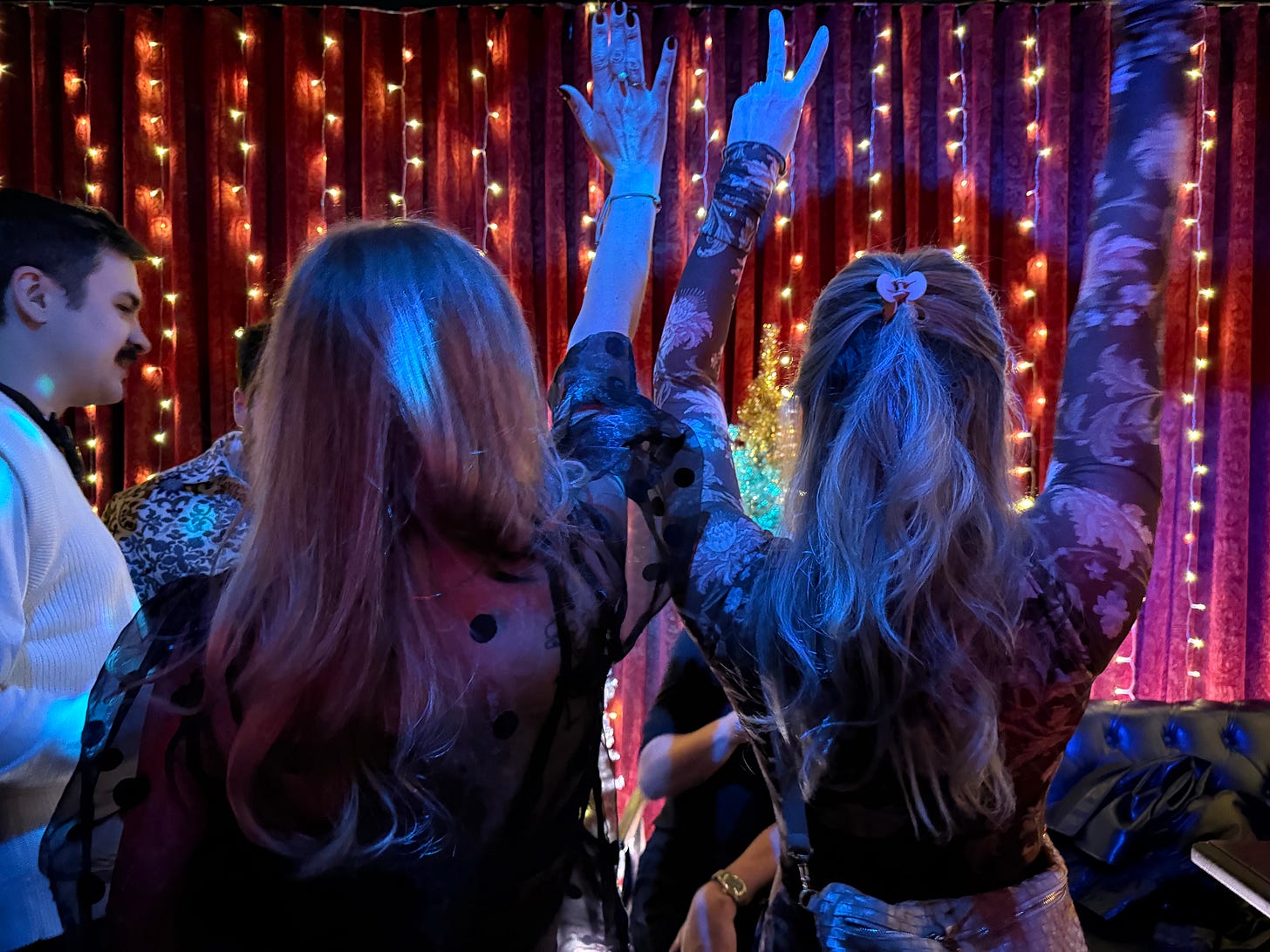Issue #84: Starting a Substack made no sense...
Why I did it anyway, and what it’s been like.
Written by
. Edited by .Two years ago, before Aja and I (Aliza) started Platonic Love, we were little more than acquaintances. Sometimes, we’d go to yoga on Sunday mornings and grab coffee afterwards. But I described her to others as a friend of a friend and had no idea what her plans were for New Year’s Eve or her boyfriend’s birthday.
Over time, we started to divulge small — and then larger — secrets to each other. Post-yoga coffee turned into breakfast; eventually, we skipped yoga and started taking long walks or getting dinner. I began to feel like Aja was a person I could trust to help me work through challenges as well as insecurities. But it never crossed my mind to share the things we were talking through online…
Until one day, flying back to Boston, when I had a particularly infuriating newborn mom experience — one that ratcheted up my heart rate and filled me with rage. The experience weighed on me for weeks… until I journaled about it. On paper, it felt illuminating and relatable rather than private and shameful.
I told Aja I’d written about pumping on the plane (and what had happened before I’d boarded). “Publish it!” she said. I’d previously floated starting a newsletter to her — one about podcasts, to help people find new things to listen to. This essay was a sharp right-turn into the personal.
But as we talked, we realized my experience was only the tip of the iceberg. The “messy middle” — the term we’d been using between ourselves to describe the years between 25 and 35, when you’re going from twenty-something to Adult with a capital A — is confusing, exhilarating, sometimes lonely, always interesting. And while we saw plenty online about dating in your twenties, or having a kid, we didn’t see anything about the transition from one life stage to the next, or what it feels like when your friends are in a different life stage than you.
So we started Platonic Love.
Hundreds of issues later, this newsletter — and our friendship — is an enormous part of my life. Here’s what it’s been like to write about ourselves on the internet:
1. It’s terrifying.
Since that first issue, I’ve published dozens of personal stories that make my chest tighten and my armpits sweat, from questioning what it means to bounce back after giving birth to talking about my miscarriage.
Each issue goes through several rounds of revisions and edits, a time for me and Aja to sense-check our ideas, develop the flow, and tighten every sentence — but the night before one of mine goes out, I still read it two, three, or ten (!) more times. And as soon as the email hits my inbox, I’m reading it again. As if, in doing so, I could control how you reacted to it.
Then I take a deep breath, and remind myself why I’m doing this.
2. Vulnerability has fostered connection.
More than anything, I’m proud of — and grateful for — the way writing about my self and life online has brought me closer to my IRL community.
I was nervous the first time I wrote about a conflict with Sam. “What did you think?” I asked, my voice hesitant, after he read through an early draft. “I love it,” he said. “It makes me really, really proud of us — to see that you understand me too.”
Platonic Love, and the consistent vulnerability it requires from me, has helped me feel more comfortable than ever before bringing up sensitive topics, insecurities, and off-the-wall ideas with my close family and friends. On a related note…
3. It’s put the “getting to know you” process into hyper-drive.
Last December, while Aja and I were walking down Newbury Street, I glanced at Find My Friends and realized my friend Charlotte, who lives in California, was a few blocks away. I immediately texted her, and we decided to meet at a nearby cafe.
“That was my first time hanging out with Aja,” Charlotte said later. I almost couldn’t believe it — we’d talked for hours, and the conversation had flowed so naturally, far from an “it’s nice to meet you” first friend date.
Charlotte said she already felt like she knew Aja. Because she reads Platonic Love, we’d skipped the surface-level talk and delved into big topics, like burnout at work, how people our age could afford to buy a house, and our partners’ relationships to our friends.
4. Sometimes it feels like Aja and I are sharing a brain.
This has been one of the coolest (and most unexpected) parts of the creative relationship. Along with frequently buying the same clothing, Aja and I will often text each other something or send a voice note only to hear back, “You read my mind” or “I was just thinking about that!” It’s always so energizing and fun.
5. But that doesn’t mean our relationship is conflict-free.
It was probably naive to think we could take on a project this intense — and add such a new dimension to our still nascent friendship — without hitting any rough patches.
In the beginning, when we were still figuring out our process and timelines, we’d get frustrated with each other when a deadline was approaching and an essay wasn’t in a good place.
Fortunately, we’d already scheduled weekly check-ins, so we had a pre-established time and place to talk this through (rather than simmering about it in silence for months). After a long and honest discussion, we decided each week’s links and essay needed to be written by Friday and Sunday, respectively, so we had plenty of buffer if necessary. (In two years, we’ve only published an essay late once.)
And there have been stretches of several months where one person is struggling to do their half of the work — like in the months after I was laid off, when I was stressed about finding and then starting my new job, and when Aja was struggling with depression.
These big life events would impact our friendship regardless, but because we have such a big shared commitment, they come to the surface very quickly. We’ve learned to be incredibly transparent about what we can and can’t handle at any given moment… and to trust the other person to cover for us.
6. Now my family can relate to my work.
While I’ve always known my family was proud of me, I’ve also known they don’t really understand my industry or typical work-day.
Now, nearly every Thursday, I get a call from my grandmother: “You don’t know how much I wish I’d had this when I was your age!” she says, or, “I loved what Aja said today about makeup!”
I’ve noticed my friends (particularly the ones I don’t typically talk to every day) are quicker to reach out, too — asking for podcast and book recommendations, sharing reactions to a piece, or checking in on how something I’d talked about in the newsletter went. And I’ll often ask my mom or a close friend to read something before I publish it. On several occasions — like this essay on aging or this one on main character energy — they’ve given me the perspective I needed to pull it all together.
7. It’s an exercise in self-awareness.
There are so many writers and creators I idolize. When I first started writing Platonic Love, I (sometimes subconsciously, sometimes intentionally) tried to borrow the elements of their craft I appreciated most —
’s quick wit and humor, ’s incredible cultural analysis, ’s social critique — but because those elements don’t come as naturally to me, they inevitably fell flat on the page.It took time to find what worked for me. I’ve learned that writing my first draft by hand forces me out of my head, so I can avoid the comparison game and be immersed in the creative process. And my style is telling personal — sometimes cringe-worthy — stories and drawing meaning from the mundane.
Since the earliest days, Aja and I’ve used a simple check to evaluate topics for Platonic Love: Is it something we’d bring up with our best friends over coffee?
8. I love making — and featuring — our friends!
Platonic Love has helped Aja and I strike up several “online to real” relationships with writers like
of , of , Lilly of , of , Ellie of , and many more.I’ve also made some truly bonkers connections — like when
of and I realized, after connecting online, she was the niece of a long-time family friend, or two of my closest and oldest friends told me I had to talk to of . (They were right!)And I’ve gotten to collaborate professionally with friends I’ve had for many years — like my childhood friend Justine, founder of the kids’ clothing brand Mmoody Kids, and
, travel writer for the Washington Post and author of the newsletter .It’s been a blast. Thank you so much for your continued support!
If you enjoy reading Platonic Love, there are a few ways to let us know: “like” this post, leave a comment, buy us a coffee, or upgrade to a Paid subscription. We read and appreciate every single comment, mention, and subscriber note. Happy New Year!








I love Platonic Love; you grateful you guys set an example for vulnerable sharing. In my experience on Substack there are so many kind readers who meet my vulnerability with their own. I have made incredible friends on this app, it’s so unlike anywhere else on the internet.
Adore you both! Thrilled Substack brought us together. xx